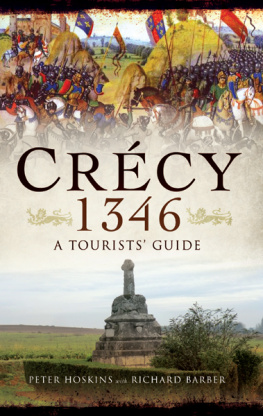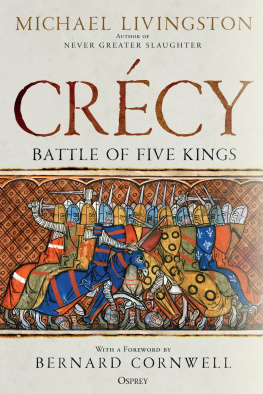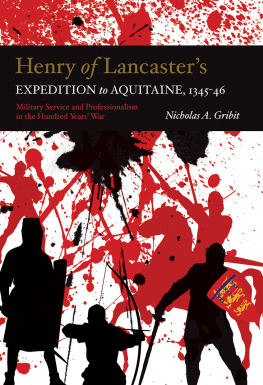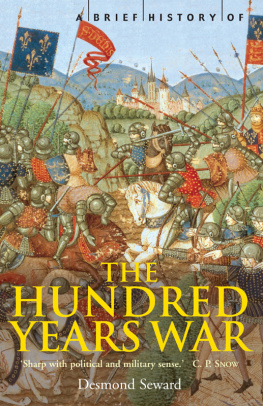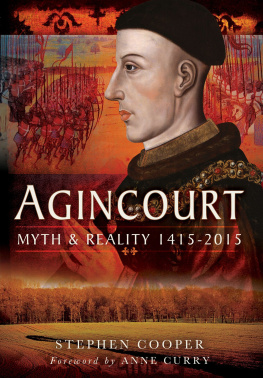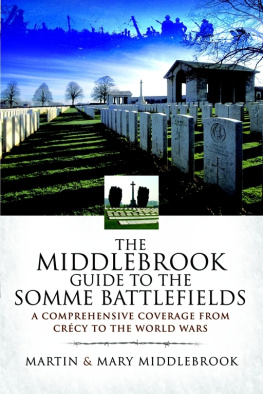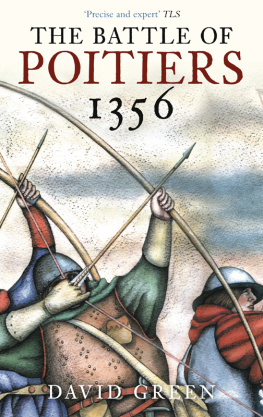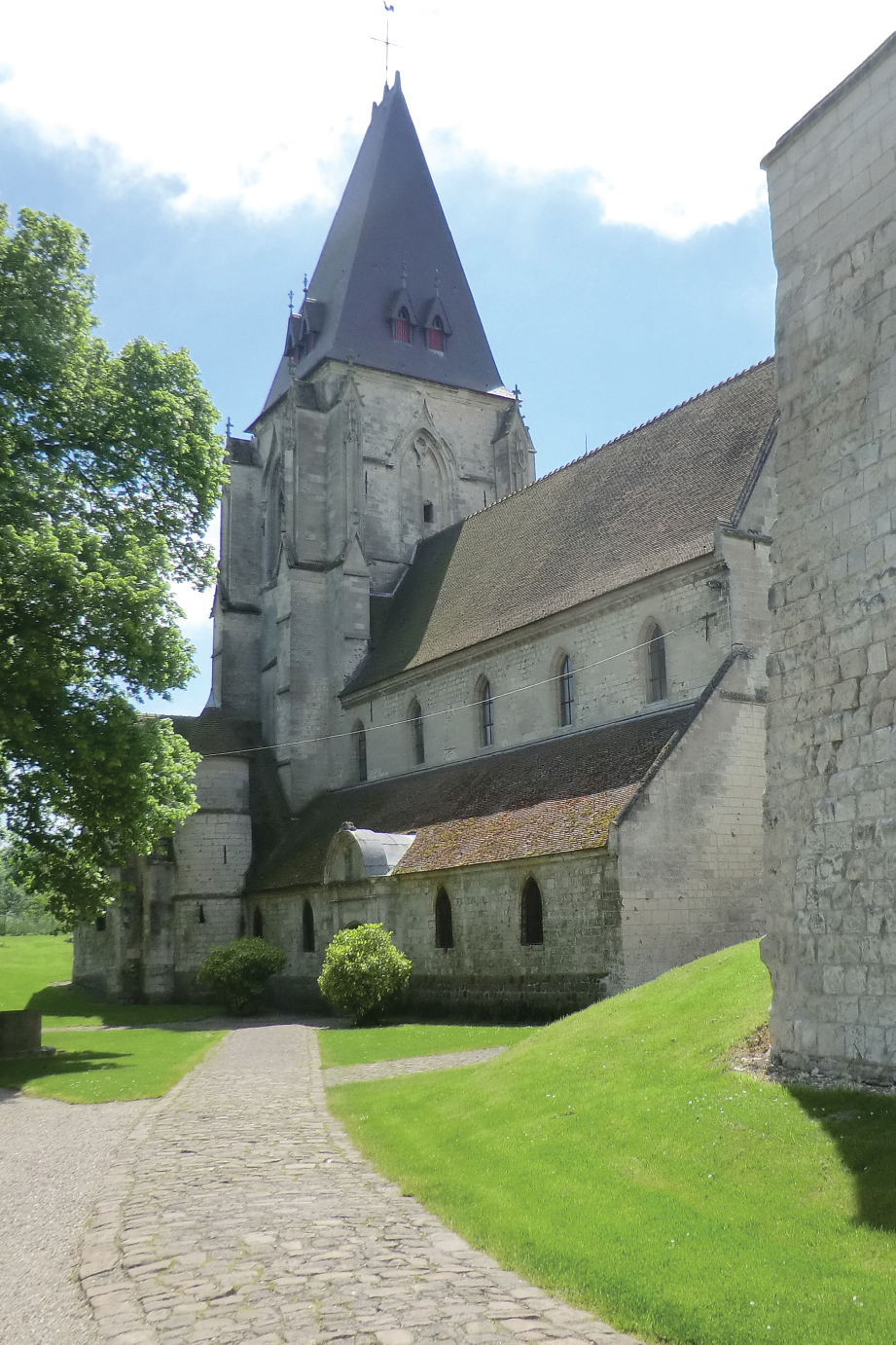
The church of St Martin in Picquigny. (Peter Hoskins)
First published in Great Britain in 2016 by
PEN & SWORD MILITARY
an imprint of
Pen & Sword Books Ltd
47 Church Street
Barnsley
South Yorkshire
S70 2AS
Copyright Peter Hoskins and Richard Barber, 2016
ISBN: 978 147382 701 1
PDF ISBN: 978 1 47389 776 2
EPUB ISBN: 978 1 47389 775 5
PRC ISBN: 978 1 47389 774 8
The right of Peter Hoskins and Richard Barber to be identified as Authors of the Work has been asserted by them in accordance with the Copyright, Designs and Patents Act 1988.
A CIP catalogue record for this book is
available from the British Library.
All rights reserved. No part of this book may be reproduced or transmitted in any form or by any means, electronic or mechanical including photocopying, recording or by any information storage and retrieval system, without permission from the Publisher in writing.
Typeset in Palatino and Optima by
CHIC GRAPHICS
Printed in India by Replika Press
Pen & Sword Books Ltd incorporates the imprints of
Pen & Sword Archaeology, Atlas, Aviation, Battleground, Discovery, Family History, History, Maritime, Military, Naval, Politics, Railways, Select, Social History, Transport, True Crime, Claymore Press, Frontline Books, Leo Cooper, Praetorian Press, Remember When, Seaforth Publishing and Wharncliffe.
For a complete list of Pen & Sword titles please contact
PEN & SWORD BOOKS LTD
47 Church Street, Barnsley, South Yorkshire, S70 2AS, England
E-mail:
Website: www.pen-and-sword.co.uk
CONTENTS
PREFACE
The origins of this guide lie in my project, which I started in 2005, to follow on foot the campaigns of the Black Prince leading to his victory over King John II of France at the Battle of Poitiers in 1356. The aim was to bring a fresh look to the campaigns of 1355 and 1356 by supplementing more conventional historical research with exploration on the ground. Some readers found the book that followed, In the Steps of the Black Prince, The Road to Poitiers 13551356, useful and interesting when touring near the routes of the Black Princes campaigns, even though it lacked both detailed information on routes and practical information for tourists. Although it was not intended as a guide book, it was evident that the story and the places which featured in In the Steps of the Black Prince provided the elements for interesting holidays or excursions for those with an interest in history.
With the approach of the 600th anniversary of the Battle of Agincourt it seemed, based on my experience with In the Steps of the Black Prince, that there was room for a book specifically written to help the historical tourist follow the campaign. Thus, Agincourt 1415: A Tourists Guide to the Campaign followed. The next logical step was to write a similar guide for that great precursor to Agincourt: Crcy. This book takes the tourist from the landing place for Edward III and his army at St-Vaast-la-Hougue, through the battlefield near the village of Crcy-en-Ponthieu to Calais, where Edward settled down to besiege and capture the town.
The guide tells the story of the campaign, drawing on my experience walking the route of the English march. For the history I have drawn extensively on Richard Barbers work, particularly his Edward III and the Triumph of England, as well as local histories. This guide book follows Edward IIIs route in Galfridi Le Baker de Swynebroke, Chronicon, edited by E.M. Thompson. A modern and more easily obtained version of this valuable chronicle is The Chronicle of Geoffrey Le Baker of Swinbrook by Richard Barber translated by David Preest. This book is not intended to be an analytical history of the campaign, and it does not, therefore, either discuss in depth some of the uncertainties associated with the battle and Edwards march, or attempt to analyse and interpret the varying accounts in the primary sources. Where there is such uncertainty I have opted for what seems to me to be the most probable interpretation. The choices are mine.
For those who would like authoritative detail and analysis of the battle, they can do no better than read Richard Barbers Edward III and the Triumph of England. This book also argues strongly for the crossing of the Somme having been closer to the river estuary than others have assumed. The Battle of Crcy, 1346 by Andrew Ayton and Sir Philip Preston is a valuable source for the reader who wishes to read the story of this battle in depth. The chapter by Sir Philip Preston which discusses the traditional site of the battlefield is particularly useful. Some recently published work by Kelly de Vries and Michael Livingstone in The Battle of Crcy, A Casebook suggests an alternative site for the battle.
Peter Hoskins
ACKNOWLEDGEMENTS
I am particularly grateful to Richard Barber for his contribution to this book. I could never expect to match his knowledge of King Edward III, his eldest son Edward the Black Prince and the period in which they lived, and I was, therefore, delighted when he agreed to allow me to draw on his published work and also to advise me on the text. He has given a good deal of his time and patience to advising me and I cannot thank him enough for his guidance.
I am also grateful to my walking companions John Griffin, Martin Hoskins, and David Finnimore, who patiently followed parts of the route with me. My thanks also to those who have allowed me to use their photographs and illustrations: Richard Barber, Paul Hitchen and Chris Dawson. Finally, and by no means least, thanks to Scott Hall for the time and skill he has devoted to drawing the maps and the plan of Caen.
ADVICE FOR TOURISTS
Introduction
This guide has been written primarily with the motorist in mind, but with additional information for those who want to follow the routes either on foot or on a touring bicycle. The guide is divided into six tours following the itinerary of Edward III and his army from the landing at St-Vaast-la-Hougue, through the battlefield at Crcy-en-Ponthieu, to Calais, where Edward III settled down to besiege and capture the town. Five tours cover the route from St-Vaast-la-Hougue to Calais and the sixth covers the battlefield. A half-day visit will allow ample time to see the battlefield and the museum in the village of Crcy-en-Ponthieu. The other tours can each be covered in a day or so by car. Two or three days would be comfortable for a cyclist, and the walker will need to allow about a week for each tour. Walking the entire route would require about five weeks.
How to Get There and Back by Public Transport
The tours start and finish at towns of sufficient size to provide a selection of accommodation. The nearest airports for each tour are given, and with the walker and cyclist in mind there is information on rail access to the start and end of each tour. Information is also given on intermediate towns with access by public transport to enable walkers and cyclists to tailor tours to meet time available or particular interests.
The French railways, SNCF, have an extensive network. They also run co-ordinated bus, autocar or car services as replacements for defunct lines to link some rail services. The website for planning a journey is www.voyages-sncf.com. An English language version, www.voyages-sncf.co.uk, will take you to Rail Europe, www.raileurope.co.uk. These sites will generally give you all the information you need for the route. However, the network is organized regionally and full timetables, details on station services and locations, and route maps are given on regional websites. Start on www.ter-sncf.com and then go to the appropriate region: Haute-Normandie, Picardie and Nord-Pas-de-Calais. For rail journeys in the le-de-France use www.transilien.com. Tickets for trains on the le-de-France services cannot be booked in advance.
Next page
